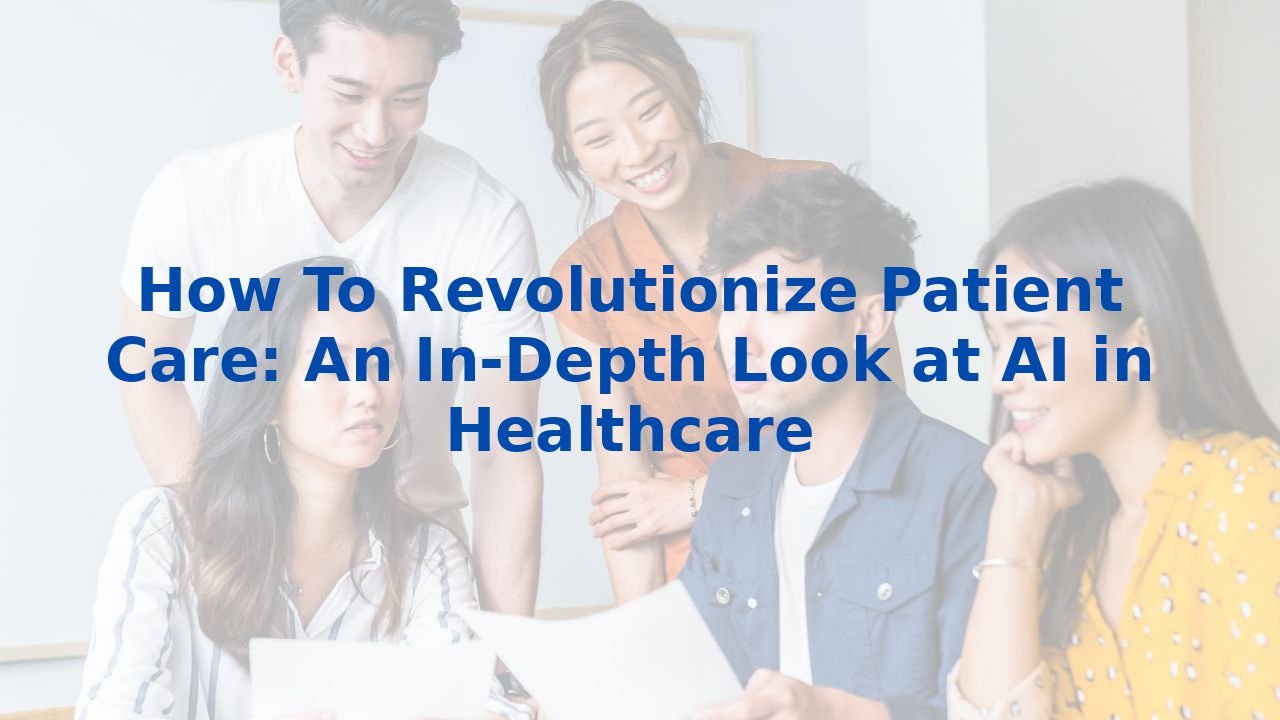How To Revolutionize Patient Care: An In-Depth Look at AI in Healthcare
How To Revolutionize Patient Care: An In-Depth Look at AI in Healthcare
Introduction
The healthcare landscape is not just changing; it’s transforming at an unprecedented pace. Driven by the dual need to enhance patient outcomes while curbing costs, organizations are increasingly looking towards artificial intelligence (AI) as the catalyst for this revolution. This exploration of AI's role in healthcare goes beyond the buzzwords, diving deep into how AI can streamline essential business processes, enhance operational efficiency, and ultimately, enrich patient care.
Current Challenges in Healthcare
Complexity defines the healthcare system. With myriad stakeholders—patients, providers, and administrative personnel—the current methods often balloon into cumbersome, error-prone processes. Manual operations not only consume valuable time but also escalate costs, leaving patients often grappling with high out-of-pocket expenses. A paradigm shift is imperative, and AI stands as a beacon of hope, promising to streamline operations without sacrificing quality.
How AI Enhances Healthcare Processes
1. Data Management and Analysis
Data is the lifeblood of informed decision-making in healthcare. AI excels at managing colossal datasets, drawing insights that might elude even the most experienced professionals. By employing advanced algorithms to discern patterns and predict outcomes, healthcare providers can capitalize on timely interventions, potentially altering the course of a patient's health journey.
2. Clinical Decision Support Systems
Imagine a world where healthcare professionals are equipped with instantaneous insights into patient histories and potential treatment paths. AI-driven clinical decision support systems offer precisely this, bolstering diagnostic accuracy while prescribing more effective treatments. They keep a vigilant eye on patient progress, alerting clinicians to any sign of complications before they escalate.
3. Administrative Efficiency
The administrative side of healthcare often feels like navigating a labyrinth. However, with AI's ability to automate repetitive tasks—billing, scheduling, record-keeping—the fog begins to lift. Streamlined operations allow staff to dedicate more time to quality patient interactions, thereby enriching the overall care experience.
4. Patient Engagement
In the age of technology, patients seek interaction on their terms. AI-driven chatbots and virtual assistants increase engagement by providing tailored advice and support at the touch of a button. This proactive approach equips patients to manage their health more effectively, mitigating the need for frequent in-person consultations and enhancing overall satisfaction.
5. Predictive Maintenance
Unforeseen equipment failures can derail care delivery. AI's predictive analytics foresee these failures, ensuring that medical equipment is always operational. This not only boosts the efficiency of healthcare facilities but also enhances the quality of care through uninterrupted service delivery.
Benefits of AI in Healthcare
1. Improved Accuracy
The precision that AI brings to data analysis is unparalleled. This newfound accuracy leads to more reliable diagnoses and effective treatment plans, ultimately sculpting better health outcomes.
2. Enhanced Patient Care
With its capacity to provide real-time insights and personalized care plans, AI contributes significantly to improved patient experiences. An engaged patient is a healthier patient.
3. Cost Reduction
By automating administrative tasks and optimizing resource allocation, AI can dramatically reduce operational costs. Healthcare providers can channel these savings directly into enhancing patient care.
4. Increased Efficiency
In essence, AI serves to streamline various operational aspects within healthcare settings, significantly reducing the time and resources consumed. This efficiency empowers healthcare professionals to return their focus where it belongs—on delivering outstanding patient care.
The Importance of Training Employees for AI
Integration of AI isn’t merely a technological shift; it necessitates a cultural transformation within healthcare organizations. This starts with training employees to interact effectively with AI systems:
- Understanding AI Capabilities and Limitations: A foundational grasp of what AI can and cannot do unlocks the potential of these tools.
- Formulating Effective Questions and Prompts: The quality of AI output hinges on the input. Skilled prompts yield accurate responses, enhancing decision-making.
- Evaluating AI Output: Critical assessment of AI-generated insights ensures relevant information shapes clinical decisions.
- Integrating AI into Daily Practices: Ensuring that AI becomes an integral part of workflows will maximize its efficiency across the organization.
Conclusion
The embrace of AI within healthcare is not just an opportunity; it's a necessity. By leveraging its capabilities to streamline data management, support clinical decision-making, optimize administrative tasks, and enhance patient engagement, organizations can lower costs while enriching patient care. Yet, success hinges on one crucial aspect: a well-defined strategy for employee training. Investing in your workforce equips healthcare professionals to wield AI effectively, paving the way for a patient-centered healthcare system that truly revolutionizes care delivery.
For those keen on embracing this transformative journey, comprehensive training opportunities await, ensuring your team is ready to harness the full potential of AI in healthcare.



